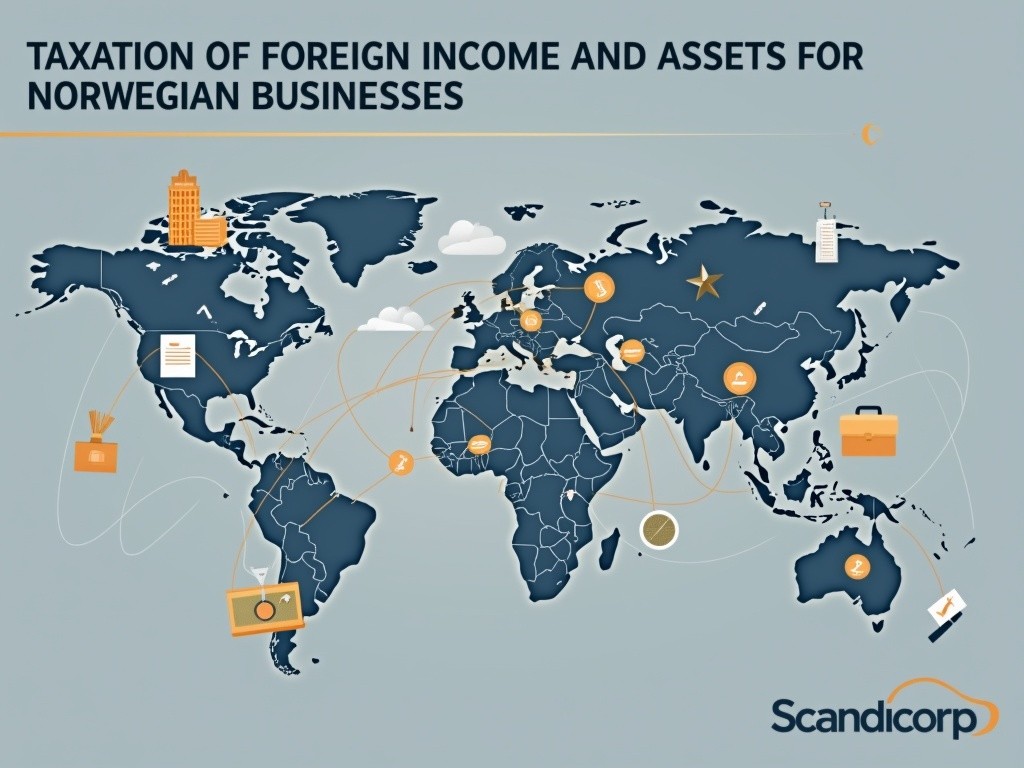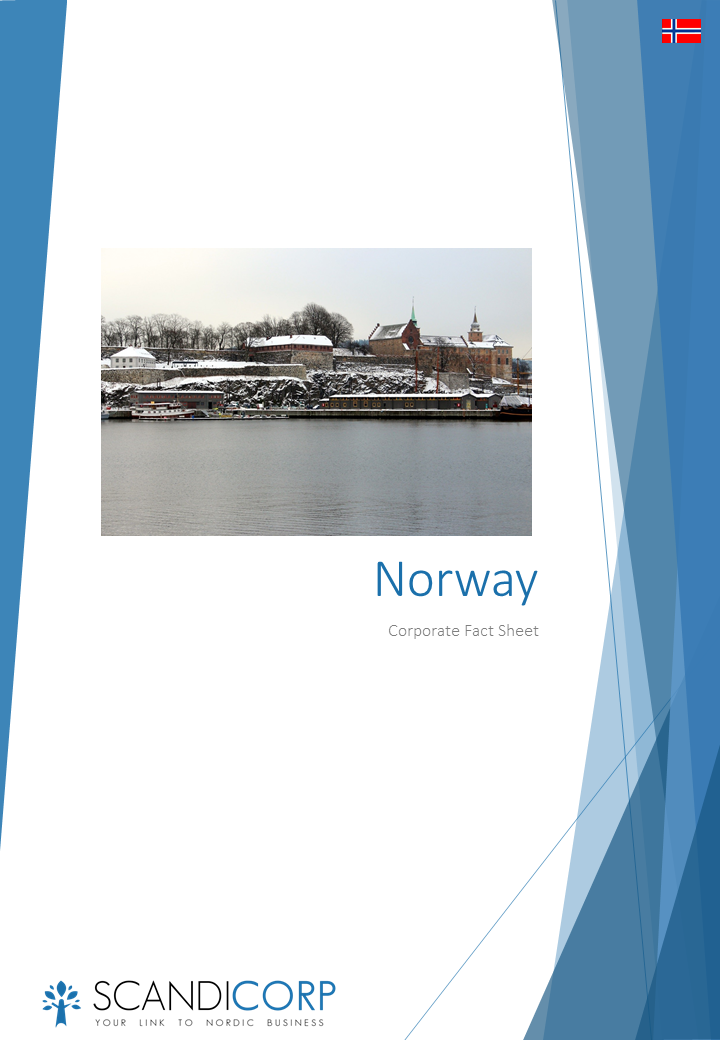Taxation of Foreign Income and Assets for Norwegian Businesses
Taxation of Foreign Income and Assets for Norwegian Businesses: Navigating Cross-Border Taxation with Confidence
Norwegian businesses are increasingly engaging in cross-border activities, from expanding into international markets to managing foreign subsidiaries and investments. While these opportunities offer immense potential for growth, they also bring complex tax challenges, particularly in the taxation of foreign income and assets.
Understanding how foreign income is taxed under Norwegian regulations, as well as navigating international tax treaties, Controlled Foreign Company (CFC) rules, and withholding taxes, is essential for ensuring compliance and optimizing tax outcomes.
At Scandicorp, we specialize in providing expert guidance to businesses operating in the Nordic region, helping them navigate the intricate web of cross-border taxation with clarity and confidence. In this article, we delve into the key aspects of foreign income and asset taxation for businesses operating in Norway, offering insights and solutions to help your business stay ahead.
Taxation of Foreign Income for Businesses in Norway
Norway follows a worldwide income taxation principle for companies that are considered tax residents in the country. This means that Norwegian companies are subject to tax on their global income, regardless of where it is earned. Foreign income is included in a company’s taxable base, and businesses are required to report such income in their annual tax returns.
Key considerations include:
- Income earned through foreign branches or permanent establishments is taxable in Norway, though certain foreign tax credits may apply to avoid double taxation.
- Income from foreign subsidiaries is subject to specific rules, such as the participation exemption, which may exempt certain dividend income from taxation, provided specific conditions are met.
Proper reporting and structuring of foreign income are crucial to mitigate risks of tax overpayment or penalties. Scandicorp has extensive experience in helping Norwegian businesses align their foreign income reporting with domestic tax laws, while identifying opportunities for tax optimization.
Tax Treaties and Their Role in Foreign Income Taxation
Tax treaties play a pivotal role in determining how foreign income is taxed, especially when it comes to avoiding double taxation and ensuring fair allocation of taxing rights between countries. Norway has signed tax treaties with numerous countries, based on the OECD Model Tax Convention, to promote international trade and investment.
Key benefits of tax treaties include:
- Elimination of Double Taxation: Treaties typically include provisions for foreign tax credits or exemptions to ensure businesses are not taxed twice on the same income.
- Reduced Withholding Taxes: Many treaties reduce or eliminate withholding taxes on cross-border payments such as dividends, interest, and royalties.
- Permanent Establishment Rules: Treaties define when a business has a taxable presence in a foreign country, preventing undue taxation.
Navigating the intricacies of tax treaties requires a thorough understanding of both Norwegian regulations and the treaty provisions. Scandicorp is adept at analyzing tax treaties to ensure that Norwegian businesses maximize the benefits of these agreements while staying compliant with cross-border tax obligations.
Understanding Controlled Foreign Company (CFC) Rules in Norway
Controlled Foreign Company (CFC) rules are designed to prevent Norwegian businesses from shifting profits to low-tax jurisdictions. These rules ensure that income earned by controlled entities in such jurisdictions is taxed in Norway, even if it has not been distributed as dividends.
Under Norwegian tax law, a foreign company is considered a CFC if:
- The Norwegian company or group controls at least 50% of the foreign entity, directly or indirectly; and
- The foreign entity’s effective tax rate is less than two-thirds of what it would be under Norwegian taxation.
When CFC rules apply, the income of the foreign entity is included in the taxable income of the Norwegian controlling entity, proportionate to its ownership stake. This can lead to significant tax implications for businesses with operations in low-tax jurisdictions.
Scandicorp helps businesses navigate CFC rules by:
- Assessing whether a foreign entity falls under the CFC regime.
- Developing strategies to mitigate potential tax liabilities.
- Ensuring compliance with Norwegian tax authorities while maintaining global tax efficiency.
Withholding Taxes on Repatriated Income
When Norwegian businesses repatriate income, such as dividends or royalties from foreign subsidiaries, withholding taxes may apply. These taxes are levied by the source country before the income is transferred to Norway.
The rates and applicability of withholding taxes depend on several factors:
- Tax Treaty Provisions: Many treaties reduce withholding tax rates or eliminate them entirely for qualifying payments.
- Participation Exemption: Under Norwegian tax law, dividend income from qualifying foreign subsidiaries may be exempt from taxation in Norway, reducing the overall tax burden.
For instance, a Norwegian parent company receiving dividends from a subsidiary in a treaty country may benefit from reduced withholding tax rates under the treaty, combined with the participation exemption in Norway.
Withholding taxes can be complex to manage, but Scandicorp’s tax experts simplify the process. We ensure that businesses claim all available treaty benefits and exemptions, minimizing tax leakage on repatriated income.
Compliance and Reporting Requirements
Operating internationally requires strict adherence to both Norwegian tax laws and international reporting obligations. Businesses must:
- Report foreign income and assets in their annual tax returns.
- Maintain transfer pricing documentation for cross-border transactions.
- Comply with Country-by-Country Reporting (CbCR) requirements if they meet certain thresholds.
- Claim foreign tax credits or exemptions accurately, supported by appropriate documentation.
Failure to comply with these requirements can result in penalties and reputational damage. Scandicorp assists businesses in meeting their compliance obligations by providing tailored advisory services, preparing accurate documentation, and proactively identifying risks to ensure full alignment with Norwegian and international regulations.
Leveraging Scandicorp’s Expertise in Cross-Border Taxation
Navigating the complexities of foreign income and asset taxation requires in-depth knowledge and a strategic approach. At Scandicorp, we pride ourselves on delivering customized solutions that help businesses succeed in the global marketplace.
Our expertise includes:
- Structuring cross-border operations to optimize tax efficiency.
- Interpreting tax treaties and leveraging their benefits to minimize double taxation and withholding taxes.
- Ensuring compliance with Norwegian CFC rules and other international regulations.
- Providing proactive guidance on reporting requirements and tax planning strategies.
No matter the size or scope of your business, Scandicorp is here to provide the clarity and support you need to thrive internationally.
Final words
Managing foreign income and assets presents both opportunities and challenges for Norwegian businesses. By understanding the key aspects of cross-border taxation—including tax treaties, CFC rules, and withholding taxes—businesses can remain compliant while optimizing their tax positions.
Scandicorp is your trusted partner in navigating the complexities of international taxation. Our team of experts is ready to assist you with tailored solutions that ensure compliance and drive long-term success.
Contact us today to learn how we can help your business grow with confidence.







